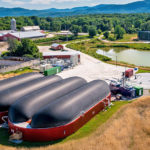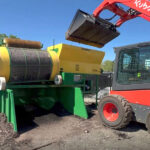Top: The spores of Aspergillus niger are manually squashed using a specially designed 96-well plate for mutant screening. Photo by Jasmin Alvarez, courtesy of Pacific Northwest National Laboratory
Researchers sometimes genetically engineer microorganisms — such as fungi — to convert renewable feedstock materials into useful biofuel or biochemical products. “Polymerase chain reaction (PCR), which allows researchers to quickly amplify DNA sequences for analysis, is one of the most essential tools in this process,” explains a recent article published by the U.S. Department of Energy’s Bioenergy Technologies Office (BETO). “When working to synthesize biofuels using fungi, PCR is particularly important for evaluating various strains of mutated fungi.” Until recently, a significant bottleneck in this process has been the DNA extraction step. With support from BETO and the Agile BioFoundry (ABF) consortium, Pacific Northwest National Laboratory researchers have found that simply squashing the fungal spores — rather than the fungal biomass — reliably yields high-quality DNA samples suitable for use in PCR. This discovery allows the researchers to amplify genome DNA orders of magnitude faster than conventional methods. The researchers are calling the “remarkably effective” method “squash spore PCR.” To address the labor required to squash lots of samples by hand, a specialized plastic plate was created with 96 wells and a corresponding cover with pins to more efficiently squash large volumes of samples.













